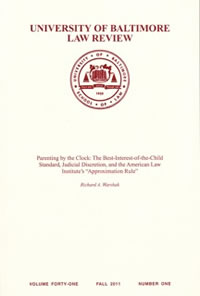STORE

SSL Certificate
Books, Articles, Videos, and Speeches by Dr. Richard A. Warshak
These links go to pages with information about each item: CR01 | CR03 | CR04 | CR05 | CR07 | CR08 | CR09 | CR12 | CR13 | CR14 | CR15 | CR16 | CR17 | CR18 | CR19 | CR20 | CR21 | CR22 | CR23 | CR24 | CR25 | CR27 | CR28 | CR30 | CR31 | CR32 | CR37| CR41 | CR43 | CR44 | CR45 | CR48 | CR52 | CR53 | CR54 | CR55 | CR56 | CR57 | CR61 | CR62 | CR63 | CR64 | CR66 | CR68 | CR71 | WBP01-02 | WBP-DL | WPQ | DP
CR43 - Parenting By The Clock: The Best-Interest-of-The-Child Standard, Judicial Discretion, and the American Law Institute's "Approximation Rule"
The American Law Institute (ALI) proposes that in contested physical custody cases the court should allocate to each parent a proportion of the child's time that approximates the proportion of time each spent performing caretaking functions in the past. Proposals from ALI strongly influence legislatures and judges. These articles analyze the "approximation rule" through the lens of child development research and conclude that the rule is unlikely to improve on the best-interest-of-the-child standard.
 This law review article is useful in cases where a custody evaluator recommends against shared custody because of the presence of conflict between the parents. The most recent scientific studies cited in this review show that children can benefit from joint custody even when parents are in conflict. The article also makes the point that some conflict between parents is instigated primarily by one parent who seeks to marginalize the other parent's relationship with the children. These studies can be used in cross-examination of mental health expert witnesses.
This law review article is useful in cases where a custody evaluator recommends against shared custody because of the presence of conflict between the parents. The most recent scientific studies cited in this review show that children can benefit from joint custody even when parents are in conflict. The article also makes the point that some conflict between parents is instigated primarily by one parent who seeks to marginalize the other parent's relationship with the children. These studies can be used in cross-examination of mental health expert witnesses.
The law review scholarly article draws on a wealth of research (more than 400 footnotes) and concludes that: 1) public policies that encourage children's involvement with both parents after divorce are consistent with the scientific literature and with prevailing public sentiment; 2) legislation should define the best interests of children to include parenting plans that maximize parenting time, when feasible and when no circumstances exist that endanger the health, safety, or well-being of the children or a parent, such as violence, abuse, gross neglect, severely compromised parenting due to severe mental illness or severe substance abuse, or extremely poor and harmful behavior toward the children; 3) evidence is accumulating that closer to equal distributions of time are linked to better outcomes for most children and parents; 4) an exact equal-time presumption, though, may bring similar liabilities as presumptions that elevate a single factor (e.g., gender, past caretaking, or children's preferences) above all others. For instance, if a parent uses additional time with the children to undermine their love and respect for the other parent, this behavior may offset the benefits of more time with the parent who manipulates the children in this manner. But, more time with the parent who is the target of bad-mouthing may help children resist efforts to turn them against that parent.
The article defends the best-interests standard as preferable when it retains the benefits to children of individualized decision making while operating in the context of contemporary reforms that accommodate new knowledge and encourage non-adversarial resolutions of custody disputes.
CR43, law review, 81 journal pages
This item is included in bundle CR55.